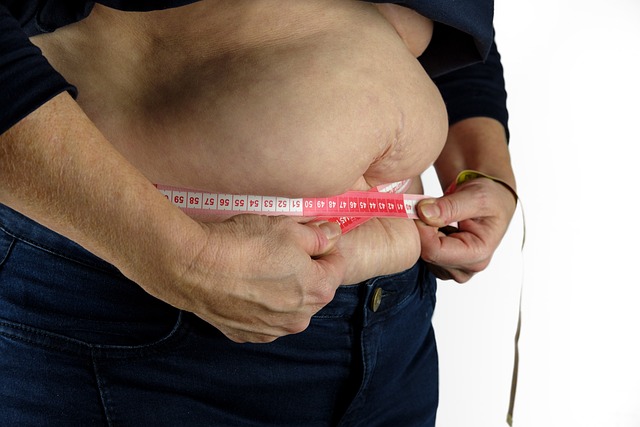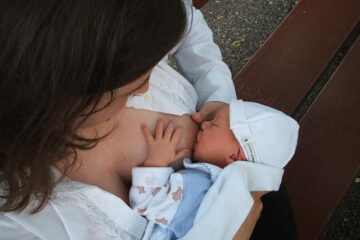Postpartum Weight Gain – 6 Reasons it May Be Happening to You
You’ve gone through your pregnancy and welcomed your new little bundle of joy. Of course, there is the necessary weight gain that comes with that. But what about afterwards? If you are experiencing postpartum weight gain, you are not alone.

Many women gain weight after having their baby. Why is that exactly? Generally, we are in the mindset that we will lose weight after having our babies. It doesn’t always happen that way, at least in the beginning. Some women actually gain more weight.
Here, we will discuss some reasons why you may be gaining weight postpartum. Let’s get started.
Medical Condition
Some women experience postpartum weight gain due to a medical condition. We will discuss a couple of examples below, but it is always best to speak with your doctor with any issues or symptoms you are having.
Postpartum Thyroiditis
Postpartum thyroiditis is a condition in which the thyroid becomes inflamed.
It can start with the thyroid being overactive, meaning that it produces more thyroid hormones than the body requires. This is called hyperthyroidism. Eventually though, it can turn into an underactive thyroid, referred to as hypothyroidism. This means that the thyroid gland doesn’t produce enough of the thyroid hormone. This can then cause weight gain, along with other symptoms such as fatigue, muscle weakness or aches, dry skin, constipation, etc.
While postpartum thyroiditis isn’t a hugely common condition, it can happen after childbirth. It is generally a temporary condition that happens within the first year after having a baby. A blood test is used to diagnose postpartum thyroiditis.
PCOS (Polycystic Ovarian Syndrome)
PCOS is an imbalance in the hormones that is caused by the ovaries. With this condition, the ovaries produce excess amounts of male hormones called androgens. PCOS can cause irregular or missed menstrual periods, as well as more serious issues such as diabetes and infertility.
A lot of women with PCOS have a resistance to insulin. This is most likely the main reason for the increased triggering of weight gain.
Symptoms of PCOS include weight gain, irregular or missed periods, excess hair growth on the body and acne.
If you suspect you might have PCOS, you should visit your doctor. A diagnosis is generally determined by an ultrasound and/or blood testing.

Lack of Sleep
Most new moms are suffering from lack of sleep; that’s certainly no secret. Unfortunately, this can contribute to postpartum weight gain or difficulty losing weight.
Sleep deprivation can cause you to have little energy (or desire) to exercise. It can also prevent the desire for you to make a proper (healthy) meal, meaning you may either opt to order takeout or make something that is quick and easy, but not necessarily healthy. It also creates more time for more eating during the day.
On average, a good amount of sleep per night is 7-8 hours. Any less than that is likely not enough for you. This study with the National Library of Medicine suggests that “Irregular sleep and meal times during the postpartum period could also interfere with body weight”.
Some tips for getting more sleep:
- Try to go to bed and wake up for the day at the same time consistently
- Sleep in complete darkness
- Avoid phone or TV screen time an hour before bed (try reading a book instead)
- Avoid caffeine or alcohol later in the day/evening
- Avoid large meals or snacks in the evening
- Adjust the temperature in your room if need be (i.e. if you wake up too hot or cold)
- Do something relaxing before bed (meditation, take a bath, read, etc.)
Stress
Postpartum weight gain can come from stress. As a new mom, you will likely experience at least some stress at one point or another.
Weight gain can come from stress hormones. If the stress hormone, called cortisol, is at a high level, that can lead to the gaining of weight. The good news is is that if you just have minor stress here and there, and your cortisol levels don’t get too high, then issues with weight gain/loss probably won’t affect you. It’s more so when cortisol levels remain at a higher level.
Another reason for weight gain (due to stress) is that some people eat more when stressed. While some of us eat less due to stress, some turn to eating more, almost like a coping mechanism.
One study shows “The cumulative 6-hour difference between one prior day stressor and no stressors translates into 104 kcal, a difference that could add almost 11 pounds/year”.
Tips to relieve stress:
- Getting your frustrations out – talking to someone (friend, family or professional)
- Journaling – writing out your issues can be very therapeutic
- Meditation
- Frequent exercise
- Yoga
- More sleep (if not getting enough, at least 7-8 hours per night)
- Take a break (do something that makes you happy, i.e. hobby, sport or even a walk)
- Get out with friends, family or significant other
- Have a spa day
Lack of Regular Routine
As new moms, our routine can get a little “wonky” in those first few, or several, post-pregnancy months. This can of course include our good exercise and eating habits. As you know, having a newborn is a busy time for new moms. Your daily routine is going to change at least a little bit.
Try not to get too frustrated if it takes you a bit of time to get your routine back in check. Once you have settled into mommyhood, whether it’s for the first time or not, gradually sink back into your normal eating and exercise routine. Obviously though, you will want to get the approval from your doctor on beginning any type of exercise before you start.
Hunger From Breastfeeding
If you are a mom who is breastfeeding, you may be experiencing more hunger than usual. Your body is burning more calories due to this, so the additional hunger is completely normal.

Even though your body is burning more calories, many breastfeeding moms tend to either not lose weight, or gain. I can relate, as I was one of these moms. Postpartum weight gain when breastfeeding can be contributed by the increase in hunger you have. If you are eating too large portions of food at a time and/or eating unhealthy foods, then that could be the reason you are gaining the weight.
To satisfy the extra hunger you are feeling, choose fruits and veggies, along with healthy proteins as a snack. The fiber in the fruits/veggies paired with the healthy protein will not only be good for you, but will keep you feeling full longer. It’s a win-win!
Postpartum Depression
For some women, postpartum depression can occur after child birth. It often consists of a fairly consistent down mood. It also can bring on additional issues, such as lack of sleep, fatigue and changes in appetite, among other more serious symptoms.
These symptoms can all contribute to weight gain or make it difficult to lose weight. However, if you are going through postpartum depression, you will want to make it your first priority to get help for it before worrying about weight loss.
If left untreated, postpartum depression can become more dangerous. Speak with your doctor as soon as possible if you suspect you have postpartum depression.
Check out this inspiring story of how this new mom lost 65 pounds after going through postpartum depression.
Summary
First and foremost, go easy on yourself if you are having troubles with postpartum weight gain. Your body has been through a lot with pregnancy and child birth. All women are different in how and when they lose their baby weight. Give yourself time and patience and you will get there.


